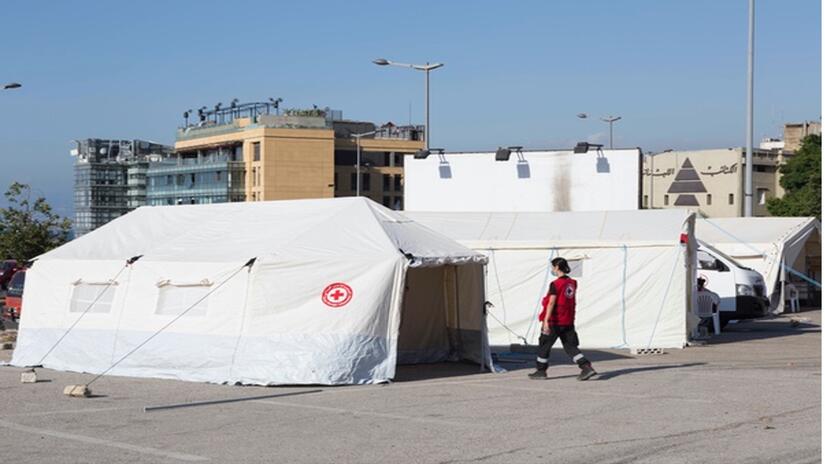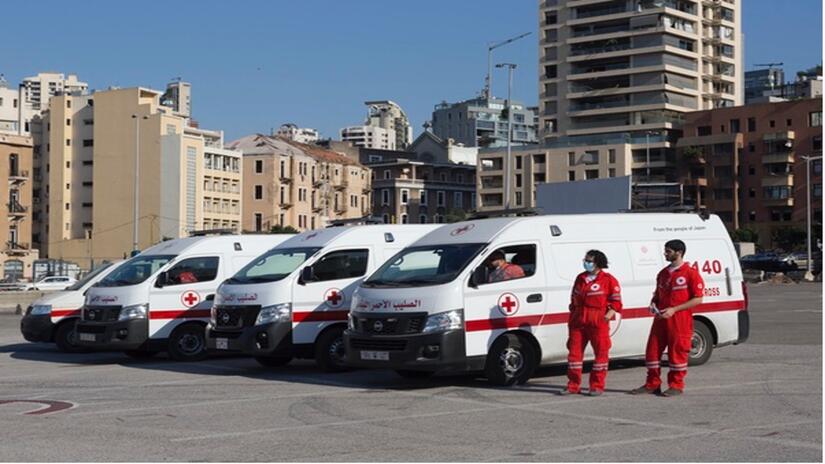Every year, hundreds of people of Lebanese, Syrian and other nationalities set off from the shores of Lebanon on extremely perilous sea journeys in desperate search for a better life.
These journeys often end up in tragedy: In September 2022, a boat carrying over 140 migrants leaving Lebanon sank off the coast of Tartus, Syria; many people drowned, while others went missing.
In other cases, boats leaving Lebanon have been pushed back by authorities in countries of destination.
Since 2019, Lebanon has been facing an evolving complex humanitarian crisis, with severe inflation, unemployment and deteriorating living conditions pushing people to leave the country.
“People who usually take the decision to leave often tell us that they have nothing to lose, so they are willing to risk their lives in order to have a chance at a better life in another country,” says Alaa Ammar, Migration Lead and Protection Coordinator at the Lebanese Red Cross.
Migrants who survive drowning incidents return to the shore suffering from exhaustion and in need of medical assistance. They often have a place to go to, or a relative to stay with, but they don’t have any money for transportation or to simply get by.

Members of the Lebanese Red Cross Humanitarian Service Point team that responds to shipwrecked migrants stand outside their response vehicles.
Photo: Lebanese Red Cross
Bringing services where needed most
Recognizing the needs of migrants who suffer the consequences of pushbacks from other countries and shipwrecks, the Lebanese Red Cross established mobile Humanitarian Service Points (HSPs) covering different locations along the Lebanese coast.
These HSPs are safe, welcoming and strategically located spaces where migrants and displaced people can access reliable support from Red Cross and Red Crescent Societies.
“The Lebanese Red Cross’ mobile HSPs offer a variety of services based on the need and urgency of the situation,” says Alaa, who also oversees a program called Restoring Family Links that helps migrants reconnect with family members. Other services include emergency medical assistance, shelter, water, hygiene and sanitation services, relief items, food, psychosocial support, and transportation.
Since their establishment, mobile HSPs have been deployed on more than eight occasions in Lebanon; this includes responses in Beirut, Tripoli and at the Syrian border.
The most recent shipwreck incident occurred in December 2023, off the coast of the northern city of Tripoli, with Lebanese authorities rescuing 51 people, all of whom received emergency medical assistance from a Lebanese Red Cross mobile HSP.

Members of the Lebanese Red Cross Humanitarian Service Point team that responds to shipwrecked migrants stand outside their response vehicles.
Photo: Lebanese Red Cross
The critical factor: trust
But to deliver its life-saving assistance, the Lebanese Red Cross HSPs often rely on people’s trust, which is an essential component that allows the Red Cross Red Crescent movement to operate in local contexts around the world.
“The trust that the Lebanese Red Cross has built with people in Lebanon over the years is very evident and is shown by survivors, who often say that they feel relieved when they see our emblem,” Alaa adds.
The Lebanese Red Cross’ migration program, including HSPs, has been supported by the Middle East & North Africa Migration Network, a regional network that consists of 15 Red Cross and Red Crescent National Societies, led by the IFRC regional office in collaboration with the ICRC and Red Cross and Red Crescent National Societies from other regions.
“The MENA Migration network was established to strengthen and share expertise and experiences to work with and for migrants, including refugees, their families, and host communities,” says Yasmin Hakim, Migration and Displacement Officer at the IFRC Middle East and North Africa Regional Office.
“This year, the network plans to equip National Societies with the skills and leading training initiatives for their staff and volunteers on migration and HSPs to enhance their readiness and preparedness to assist migrants and displaced people.”
--
Click here to learn more about Migration and Displacement. For an overview of IFRC’s migration programs, click here.

